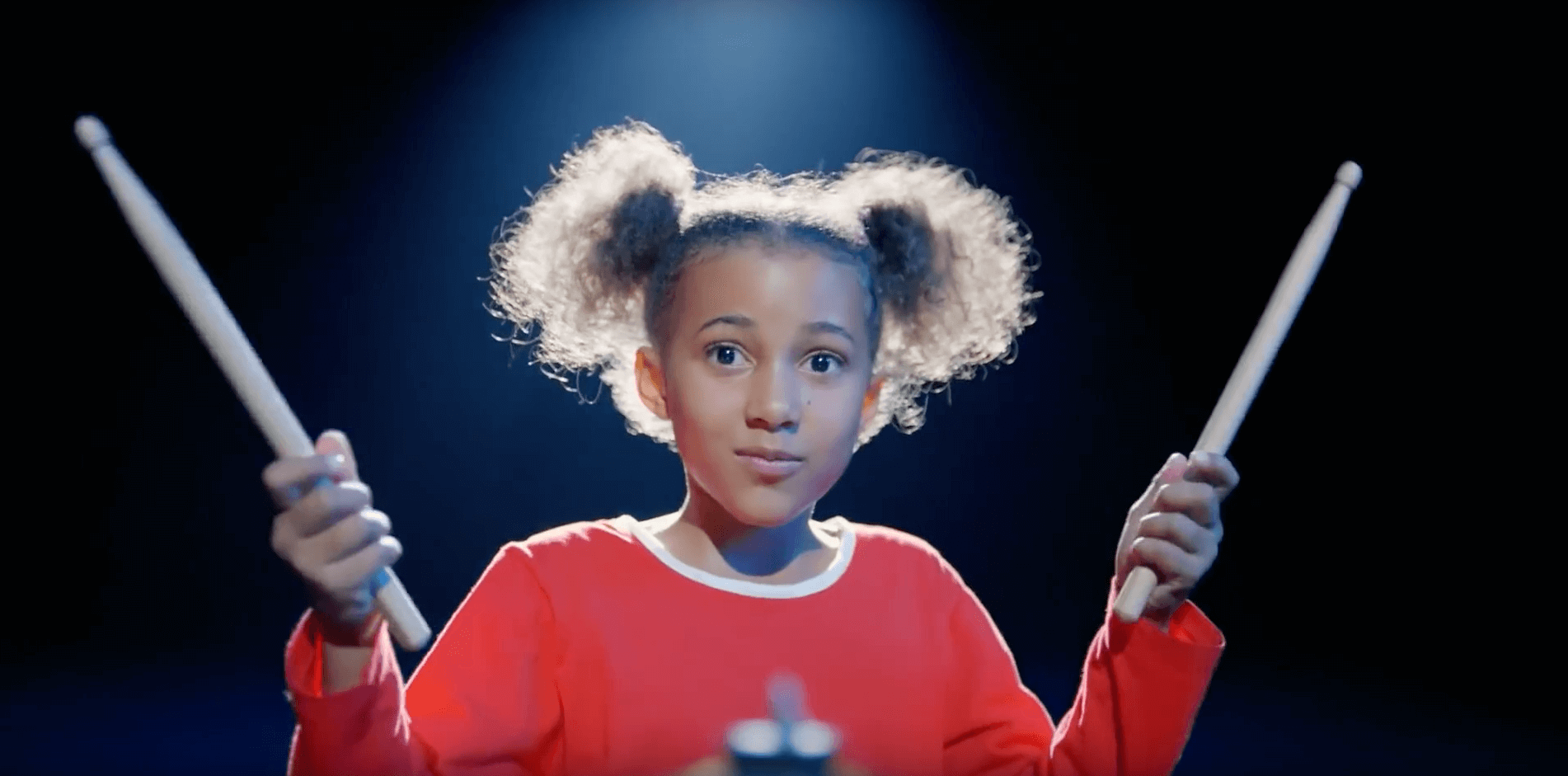Analysis: Gendered Instruments
17th December 2019Well it wasn’t quite John Lewis. But when I saw the new Argos Christmas TV ad, I did see something I wasn’t expecting…
Concerned looking father poring over an Argos catalogue? Check. Usual high energy consumerist drivel from a high street retailer? Check. So far so capitalist. But what was that? Or rather, who is that playing the (Argos branded) drum set?
A young male rocker dressed in a Def Leppard t-shirt? Actually, no. And kudos to Argos for this, but the ad is a beautiful narrative of a daughter’s dream playing the drums to a huge crowd being facilitated—and boy (or rather girl), does she rock out.
By the end of the advert, both father and daughter are thumping along to the timeless Simple Minds classic ‘Don’t You Forget About Me’.
The ad has received widespread praise: “heart-warming” from The Mirror, and “nostalgic” from The Sun for its recollection of classic Argos catalogue days. But what really hits the right note (pardon the pun) is that this advert shows us a rare headline-act indeed: a female musician, even if she’s in her pyjamas and only a child, playing the drums.
When you were a child, what instrument did you really want to learn? Piano? Violin? Drums? Do you think your gender had anything to do with your choice?
Since records began, instruments have been assigned to people depending on what is expected of their gender.
Are you a strong, confident, dominant man? The instruments for you are the drums, bass or violin, to be played in huge concert halls in front of adoring audiences.
Are you a graceful, timid and submissive woman? Then would you please be so kind as to sit quietly in the corner and play a little tune for us on the piano, flute or harp while we enjoy our afternoon tea. Or perhaps a (very quiet) concerto on the violin, played with the same submission as befits a female instrumentalist?
This is an issue being tackled by experts in the field, especially at events like a recent #MeToo research presentation at City of London University. It was an event designed to celebrate, but also to critically analyse, the role women play in the music industry and the gaps thereof. Speaking at this event was professional violinist and professor of Musicology (a great word), Tattiana Goldberg, who outlined the historical oppression of the creativity of women, particularly within the music industry.
She explains:
“Medical authorities in the 18thcentury held that women, by their nature, lacked objectivity, and consequently, the capacity for creative genius, due to their smaller brains,”
“They believed that the delicacy of women’s nerves made them unfit for the demands of abstract thought.”
The world of professional musical performance was out of bounds to women until very recently. As Professor Goldberg outlines, the stance of a violin performer with a “twisted torso”, “clamping down of the chin” and “rapid arm movements” were all considered to be inherently unfeminine.
That’s not to say, however, that women did not play these instruments at all. In fact, there were many great female violinists all throughout history – just none that were allowed to showcase their talents on the public stage.
An example is Santa della Pieta – an incredible 18thcentury Italian female violinist and composer, about whom little is documented other than that she was very talented.
And this isn’t just a historical problem. Think of your favourite guitar players, the most famous drummers? Who fronts your favourite band? The usual culprits are the likes of Jimi Hendrix, Ringo Starr and Freddie Mercury. How many of these people were female? A big fat zero. No matter how archaic these historical tropes about the “place of women” appear, they have been socially ingrained to encourage women to sit in the background, playing along, supporting the, often male, lead.
This, however, is where the Argos Christmas advert has shown progression, putting a female performer at the forefront if its, albeit, profit-driven advertising campaign. However, the amazement at a female musician is criticised by Newcastle-based saxophonist Cristina Rodriguez-Booth who said:
“Performance is considered by many as a way of showing power and authority.”
“Men use this to assert themselves in the industry, and a by-product of this is that the image of a female performer is a ‘niche’ thing. A female performer who makes it, particularly a female instrumentalist, is considered something really special when really, there are thousands of amazing female musicians. They just don’t get the opportunity to perform.”
Being prevented from performing is something Cristina has first-hand experience of: “I was recommended to join a function band when I was 17, but I got turned away because I wasn’t male,” she explains. “They wanted men in the band because they wanted someone young men could look up to and who young girls could swoon over.”
And it’s not just instruments that are gendered.
Women in Music is a charity founded in 1985 with the aim of creating gender equality in workplaces, with a particular focus on the music industry, and its statistics in all areas of the industry are troubling to say the least.
Just 6% of recognised music producers are women and just 72 of the 600 most popular songs between 2012 – 2017 were written by women.
There are positive changes however. Although it’s sad that such an event is required to take place, the #MeToo in Music event at City of London University shows that the issue has been recognised and is being tackled. And there’s another one of these events happening in January of 2020, at which King’s College London Music masters graduate and teaching assistant. Javier Rodriguez Rivas, is a speaker at the event and they said:
“We find gender imbalances in the music industry because, as with any other human activity in a heteropatriarchal society, there is a systematic discrimination against women.”
However, he outlines that there are solutions to the problem.
“A way to erase these patterns is through the visibility of musicians who play instruments that are not expected of their gender. This would offer alternative models to young musicians, and fight discrimination and negative stereotypes.”
We’re lucky enough to be in an era which sees some incredible female artists breaking the mould and playing instruments that are “not expected of their gender”.
We’re seeing lead guitarists like St Vincent shredding some alternative rock, Meg White thrashing out the drums in The White Stripes and vocal powerhouses like Beyonce and Lady Gaga becoming the pop icons of a generation.
But still, female greats are overwhelmed by the male-saturated musical landscape, which dates back right to the very beginning of people’s musical careers: musician education in schools.
Think back to your school band or orchestra. How many boys were playing the flutes? How many girls played the trumpet? Graham Wilson, who was a guitar teacher in state schools for 10 years explains how equality in musical education has suffered in recent years:
“It’s really difficult at the moment because music tuition isn’t being heavily promoted in schools,”
“In my experience, there was no difference in the number of boys and girls learning guitar up until about Year 8. Then it definitely became more male orientated.”
But this isn’t just a gender issue, it’s a class one too and it starts with the imbalance of music education in schools.
“Having the opportunity to study and to explore music isn’t a privilege. It’s a vital part of a broad and balanced curriculum.”
This was the claim from School Standards Minister Nick Gibb earlier this year, when he also promised a £1.3million investment into funding music education hubs around the country. However, the British Phonographic Industry (BPI) reported in March this year that one in four schools serving disadvantaged communities offer no musical instrument lessons to students that want them.
This is in stark contrast with affluent state schools and independent schools, which boast over 90% of students engaging with musical education. Without vital engagement in music, which often begins in their primary education, how can we expect girls to break the mould of gendered instruments?
Graham Wilson also cites the internet as playing a huge part in the drop of music tuition interest in schools: “Nobody has any money to spend on music lessons. Kids these days learn from the internet because it’s free.”
A report by the All-Party Parliamentary Group for Music Education, the Incorporated Society of Musicians and the University of Sussex on the state of Music Education earlier this year outlined the challenges facing the industry.
The report states that: “music is central to our culture and to developing us as people” and that it is something “everyone should have an opportunity to study regardless of background.” In tackling the issues facing musical education, it recommends that music should be taught by a subject specialist teacher as part of the curriculum in all state schools, for all pupils, for at least one hour per week up until the age of 14. It also recommends that the English Baccalaureate, an initiative which aimed to increase grades in core subjects such as English, Maths and Science be given a sixth pillar encouraging the study of creative subjects, including music.
It is only through reforming the educational system and giving more support to young musicians that there will be an increase in emerging female musicians.
Campaigners for equal musical education suggest that children need to be ingrained with the mantra that they can play whatever instrument they want to, no matter how “unfeminine” or “improper” society subconsciously tells them it is.
Ignore past precedents and don’t be afraid to be the only one of your gender or background in that section of the band. It should be empowering, not intimidating.
And you? The everyday, bog-standard music fan? What can you do? Widen your listening. Get onto Google, look up some female guitarists or drummers or tuba players, give them a listen. Despite their “smaller brains”, they’re not half bad, you know.


